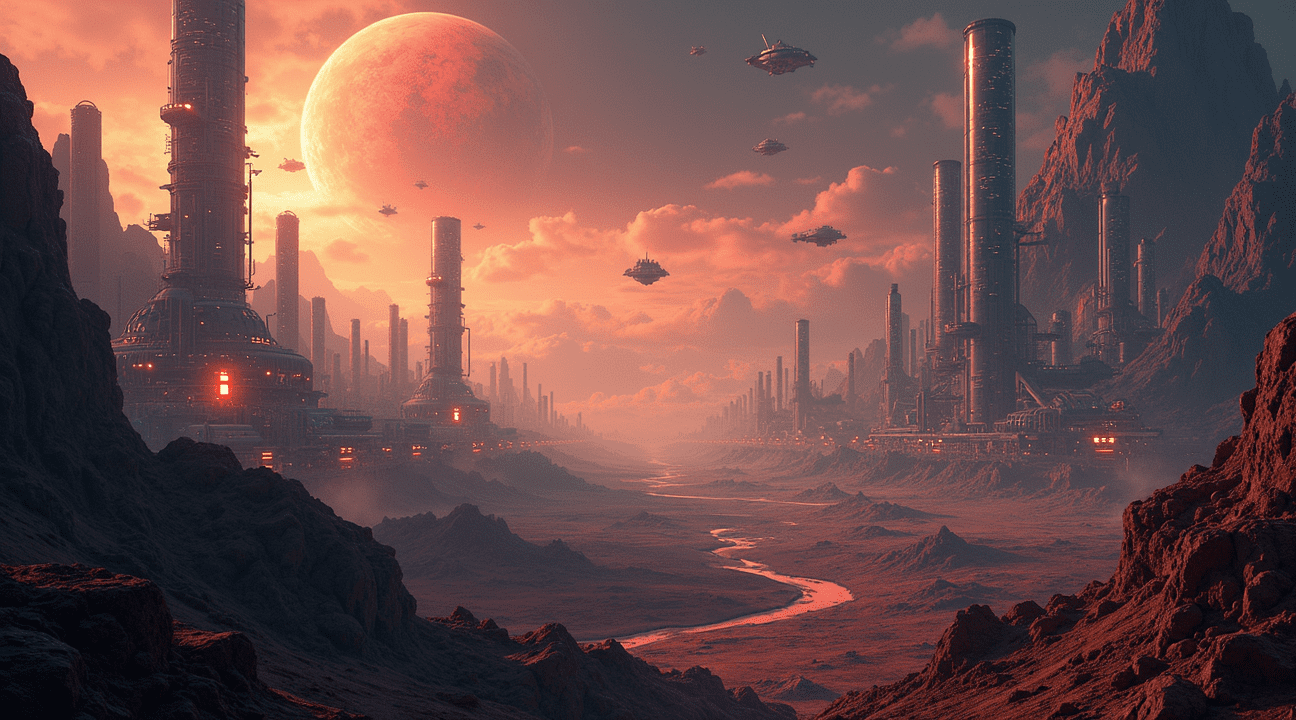The leap to quadrillionaire status represents an almost incomprehensible financial milestone, with a single individual possessing wealth equivalent to ten times the entire global GDP of approximately $100 trillion.
Technology entrepreneurs controlling revolutionary platforms like artificial intelligence, space mining operations, or breakthrough energy technologies represent the most plausible candidates. However, achieving such astronomical wealth faces massive structural barriers including regulatory responses, market competition, and historical patterns of wealth redistribution.
Key Takeaways
- Unprecedented scale challenge – A quadrillion dollars equals ten times current global economic output, making this wealth level virtually impossible under existing economic conditions.
- Technology platform monopolies offer the clearest path – Entrepreneurs who control foundational AI platforms, space mining operations, or other revolutionary technologies that become essential global infrastructure have the highest potential.
- Space-based resources could unlock quadrillion-dollar industries – Asteroid mining operations targeting resources worth hundreds of quadrillions represent perhaps the most promising wealth creation opportunity. Further details on space mining possibilities can be found at NASA’s official website.
- Inflation could create nominal quadrillionaires without real wealth – Currency devaluation and hyperinflation can produce astronomical paper wealth while simultaneously destroying actual purchasing power.
- Structural barriers make achievement extremely unlikely – Regulatory responses, progressive taxation, antitrust legislation, and social pressure historically prevent wealth concentration at levels that threaten economic stability.
The Mind-Boggling Scale: How a Quadrillion Compares to Today’s Wealth
I can’t overstate just how astronomically large a quadrillion dollars truly is. Current billionaires don’t even come close to achieving trillion-dollar status, which makes the leap to quadrillionaire seem almost impossible to comprehend. Even Elon Musk’s wealth represents just a fraction of what would be needed to reach this unprecedented financial milestone.
Putting Quadrillionaire Status in Global Context
The entire world GDP in 2025 stands at approximately $100 trillion, which means a single quadrillionaire would possess wealth equivalent to ten times the value of all global economic activity. This staggering comparison reveals the sheer impossibility of reaching such wealth under current economic conditions. Today’s richest individuals, including figures like Jeff Bezos and Elon Musk, control fortunes measured in hundreds of billions — still orders of magnitude away from quadrillionaire territory.
The Economic Transformation Required
For any individual to accumulate a quadrillion-dollar fortune, the global economy would need to undergo unprecedented expansion over several decades or centuries. This level of wealth concentration would require scenarios that seem almost science fiction today. Such possibilities might include:
- Revolutionary technological breakthroughs that create entirely new industries worth trillions
- Successful space colonization efforts that open up extraterrestrial resource markets
- Exponential growth in artificial intelligence and automation that consolidates wealth
- Development of breakthrough energy technologies that transform civilization
- Control over critical resources needed for humanity’s expansion beyond Earth
The mathematical reality is stark: achieving quadrillionaire status would require either massive economic expansion globally or an extreme concentration of existing wealth that defies current economic structures. It is fascinating that even ambitious projects like Mars colonization represent just the beginning of what might be necessary to create such wealth.
Given current wealth distribution patterns and economic growth rates, reaching quadrillionaire status appears virtually impossible within existing financial systems. The scale simply dwarfs anything humanity has witnessed, requiring either revolutionary changes in how wealth is created and accumulated or economic expansion beyond anything in recorded history.
Technology Entrepreneurs Who Could Control Entire New Industries
Visionary entrepreneurs who create and dominate completely new industries represent the most plausible path to quadrillionaire status. I believe individuals like Elon Musk exemplify this potential, though they currently remain orders of magnitude away from such astronomical wealth. Musk’s approach of capitalizing on digital platforms and breakthrough innovation across multiple sectors demonstrates the blueprint that future quadrillionaire candidates might follow.
The Platform Monopoly Advantage
Future technology entrepreneurs will likely achieve quadrillionaire status by controlling foundational platforms rather than simply participating in existing markets. Companies or individuals who own core artificial general intelligence or advanced robotics platforms could potentially extract value from virtually every industry on Earth. This positioning allows them to capture enormous rents as their technology becomes essential infrastructure for global commerce.
Elon Musk’s ambitious ventures across space exploration, electric vehicles, and neural interfaces illustrate how controlling multiple revolutionary technologies simultaneously can compound wealth creation. However, achieving quadrillionaire status requires something even more transformative than current innovations.
Industries With Quadrillionaire Potential
Several emerging industries could theoretically support quadrillionaire wealth creation:
- Asteroid mining operations could unlock resources worth quintillions of dollars, making early monopolists extraordinarily wealthy
- Artificial general intelligence platforms that serve as the foundation for all business operations globally
- Advanced robotics systems that replace human labor across entire economic sectors
- Space colonization technologies that create entirely new economies beyond Earth
- Quantum computing platforms that enable previously impossible computational tasks
- Brain-computer interface systems that fundamentally alter human capability
The combined economic impact of large language models and advanced robotics alone is speculated to be worth trillions across all industries. Single technologies like LLMs in engineering are estimated to hold potential value of $19.1 trillion, suggesting that platform owners could capture substantial portions of this wealth.
I expect that only entrepreneurs who create or control entirely new, global-scale industries will approach quadrillionaire territory. Traditional business models, even highly successful ones, simply don’t generate sufficient scale to reach such heights. The key lies in developing technologies that become indispensable to human civilization itself.
SpaceX’s innovative approach to talent acquisition and technological development provides insight into how future industry leaders might build the teams capable of creating quadrillion-dollar enterprises.
Future quadrillionaire candidates will likely emerge from breakthrough technologies that fundamentally reshape how humans live, work, and interact. These entrepreneurs won’t just improve existing systems – they’ll create entirely new paradigms that capture value from every aspect of economic activity. Whether through AGI platforms, space-based industries, or technologies we haven’t yet imagined, the first quadrillionaire will own the infrastructure that powers the next phase of human civilization.

Revolutionary Technologies That Could Create Quadrillion-Dollar Industries
The next generation of wealth creation won’t come from traditional industries. I believe entirely new sources of value will emerge from revolutionary technologies that haven’t reached their full potential yet. These breakthrough innovations could generate wealth on a scale that makes today’s richest individuals look modest by comparison.
Space-Based Resources and Interplanetary Economics
Space mining represents one of the most promising paths to unprecedented wealth creation. A single metallic asteroid contains more platinum, gold, and rare earth elements than have ever been mined on Earth. The asteroid 16 Psyche alone is estimated to contain $10,000 quadrillion worth of metals. Companies that successfully establish mining operations in space could capture value beyond current imagination.
Colonizing Mars and other planets opens additional revenue streams through real estate, transportation, and resource extraction. The first successful interplanetary logistics company could control trade routes worth trillions annually. I see potential for space-based manufacturing that leverages zero gravity and unlimited solar energy, creating products impossible to make on Earth.
Digital assets and virtual economies also show explosive growth potential. Cryptocurrency markets have already demonstrated how quickly new forms of value can emerge. Future digital assets might include ownership stakes in virtual worlds, AI-generated content rights, or quantum-computed solutions to complex problems. These markets could dwarf traditional financial systems in scope and value.
Artificial Intelligence and Computational Breakthroughs
Artificial intelligence development could produce the first quadrillionaire through sheer economic impact. Large language models and advanced AI systems are becoming essential infrastructure for every industry. The companies that control these foundational technologies will capture enormous value as AI becomes ubiquitous.
I observe that robotics integration across manufacturing, healthcare, and service industries creates massive market opportunities. Young innovators entering these fields early could build companies worth tens of trillions as automation reshapes the global economy. Robotics platforms that can perform human-level tasks will generate recurring revenue from licensing, maintenance, and upgrades.
Quantum computing presents another transformative opportunity. Companies that achieve practical quantum supremacy will solve problems currently impossible for classical computers. This capability unlocks value in:
- Drug discovery
- Financial modeling
- Cryptography
- Logistics and optimization
These sectors collectively could be worth quadrillions. The first-mover advantage in quantum computing could be insurmountable.
Revolutionary breakthroughs in the following areas could create entirely new industries overnight:
- Energy storage
- Fusion power
- Matter manipulation
Controlled fusion alone would disrupt energy markets worth hundreds of trillions globally. The individual or company that cracks these fundamental challenges will capture astronomical value.
Biotechnology and life extension technologies offer another pathway to quadrillion-dollar valuations. Companies that successfully reverse aging or eliminate major diseases will command premium pricing from wealthy populations desperate for these solutions. The market for life extension could eventually encompass most of human economic output.
I anticipate that technological convergence amplifies these opportunities:
- AI-designed rockets could accelerate space mining
- Quantum-computed drug discovery could extend lifespans dramatically
- Robotic manufacturing could reduce costs for all technologies simultaneously
The entrepreneur who successfully combines these technologies will have multiple paths to extreme wealth.
The key insight is that quadrillionaire wealth won’t come from scaling existing businesses. It requires creating entirely new categories of value that don’t exist today. Children of today’s billionaires who inherit this technological foundation have advantages, but breakthrough innovations remain accessible to anyone with vision and execution ability. Revolutionary technologies create opportunities for wealth that transcends current economic models and pushes individual net worth into previously unimaginable territory.

Space Mining and Extraterrestrial Resources as the Ultimate Wealth Creator
The pursuit of extraterrestrial resources represents perhaps the most promising path to unprecedented wealth accumulation in human history. Space mining operations targeting asteroids could unlock mineral reserves worth hundreds of quadrillions of dollars, fundamentally reshaping economic structures beyond Earth’s constraints.
Asteroids contain vast quantities of platinum, gold, rare earth elements, and other precious materials that remain scarce on our planet. A single metallic asteroid measuring just one kilometer in diameter could contain more platinum than has ever been mined throughout human history. The asteroid belt alone houses an estimated $700 quintillion worth of extractable materials, according to astronomical surveys.
The First-Mover Advantage in Interplanetary Commerce
Early pioneers who establish mining rights and operational capabilities in space will command extraordinary advantages over competitors. These trailblazers won’t just extract materials; they’ll control entire supply chains extending from asteroid extraction to Earth-based distribution networks. Consider how Mars colonization plans could create demand for space-based resources, making asteroid miners essential suppliers for interplanetary settlements.
The economic implications extend far beyond traditional resource extraction. Space mining operations will require:
- Advanced robotic systems for automated extraction
- Orbital processing facilities to refine materials
- Transportation networks connecting asteroid mines to planetary markets
- Energy systems powering remote operations
- Communication networks coordinating complex logistics
Current space industry leaders understand this potential. SpaceX continues advancing launch capabilities that could eventually support mining operations, while other companies develop specialized extraction technologies.
The regulatory landscape remains largely undefined, creating opportunities for bold entrepreneurs to establish precedents. International space law provides minimal framework for resource extraction rights, meaning early actors could secure valuable claims before comprehensive regulations emerge. This legal vacuum mirrors historical gold rushes, where quick action secured generational wealth.
Space-based manufacturing adds another wealth multiplication layer. Processing asteroids in zero gravity eliminates Earth’s gravitational constraints, enabling production of materials impossible to create planetside. These unique products could command premium prices across solar system markets.
The timeline for realizing quadrillionaire status through space mining depends on technological advancement and regulatory development. Experts estimate commercial asteroid mining could begin within twenty to thirty years, assuming continued progress in space transportation and robotic systems. Those who establish dominant positions early will likely capture disproportionate value as markets mature and expand throughout our solar system.

How Inflation Could Create Nominal Quadrillionaires Without Real Wealth
Currency devaluation and inflation have repeatedly demonstrated their power to create astronomical wealth figures on paper while simultaneously eroding actual purchasing power. Historical episodes show us that becoming a billionaire—or even a quadrillionaire—can happen overnight during periods of hyperinflation, though the real value of that wealth tells a completely different story.
Historical Lessons from Hyperinflation Events
Zimbabwe’s hyperinflation crisis between 2007 and 2009 provides a stark example of how rapidly nominal wealth can explode. Citizens literally became billionaires when buying bread, carrying wheelbarrows full of cash for simple transactions. The Zimbabwean dollar became so worthless that a loaf of bread cost billions, making everyone technically wealthy in nominal terms while being practically impoverished. Germany’s Weimar Republic experienced similar devastation in the early 1920s, where the German mark lost value so rapidly that workers needed wagons to transport their daily wages.
These events illustrate how hyperinflation transforms paper wealth without creating real prosperity. Saxon Musk and other children of today’s wealthy families could theoretically inherit quadrillion-dollar fortunes in such scenarios, though their actual purchasing power might be less than their grandparents enjoyed.
Moderate Inflation’s Long-Term Wealth Multiplication
Even moderate inflation, compounding over decades, can inflate asset values into previously unimaginable ranges. Consider how consistent 3-4% annual inflation affects wealth calculations over extended periods. Current billionaires like Elon Musk could see their net worth reach quadrillion status simply through currency devaluation, not actual wealth creation. Elon Musk’s Mars colonization plans might cost quadrillions in future inflated dollars, though the real resources required remain constant.
Asset prices tend to rise with inflation, particularly real estate, stocks, and commodities. Billionaires holding diversified portfolios could watch their nominal wealth multiply dramatically as currencies lose purchasing power globally. This process differs fundamentally from actual wealth creation through innovation or increased productivity.
The technology sector presents particularly interesting scenarios for inflation-driven wealth expansion. Young prodigies joining SpaceX early could accumulate equity that appears astronomically valuable in future inflated currency terms. Companies developing revolutionary technologies might see their valuations reach quadrillion-dollar levels through inflation alone, independent of their actual economic contribution.
Family wealth can also experience this multiplication effect across generations. Damian Musk and other children of today’s entrepreneurs inherit not just assets, but positions in an inflationary system that could theoretically multiply their nominal wealth exponentially. Custody battles over children of the wealthy take on new dimensions when considering their potential inheritance in inflated future currencies.
Sports and entertainment investments could also benefit from this nominal wealth explosion. Elon Musk’s interest in Manchester United demonstrates how diversified investments could multiply dramatically through inflation, even if the underlying assets provide minimal real returns.
Currency devaluation creates a crucial distinction between appearing wealthy and being wealthy. Quadrillionaire status becomes meaningless if a cup of coffee costs trillions in the same currency. Real purchasing power—the ability to buy goods, services, and experiences—represents true wealth, not the nominal figures printed on bank statements.
Smart wealth preservation during inflationary periods requires assets that maintain real value:
- Productive businesses
- Real estate in desirable locations
- Precious metals
- Investments in human capital and education
Those who understand this distinction will build lasting wealth, while others chase inflated numerical values that provide diminishing real returns.
The path to quadrillionaire status through inflation represents a pyrrhic victory—achieving massive nominal wealth while potentially losing real purchasing power. Understanding this dynamic helps separate genuine wealth creation from monetary illusion, providing crucial context for evaluating future wealth projections and economic predictions.
Why Quadrillionaire Wealth Faces Massive Social and Economic Barriers
I observe that achieving quadrillionaire status remains extraordinarily unlikely due to fundamental structural barriers embedded within modern economic systems. Current billionaires, including visionary entrepreneurs like Saxon Musk’s father, possess wealth that measures in hundreds of billions rather than trillions, creating an enormous gap that makes quadrillionaire status seem almost impossible.
Wealth concentration at unprecedented levels triggers automatic regulatory responses throughout history. Governments consistently implement progressive taxation, antitrust legislation, and redistribution mechanisms whenever individual fortunes grow too large relative to national economies. These regulatory barriers exist precisely because extreme inequality threatens social stability and democratic institutions.
Historical Patterns of Wealth Redistribution
Economic forces naturally work against quadrillionaire accumulation through several key mechanisms:
- Market competition erodes monopolistic positions that enable extreme wealth concentration
- Currency inflation requires exponentially larger asset valuations to maintain real purchasing power
- Technological disruption regularly displaces established industries and their wealthy leaders
- Social pressure creates expectations for philanthropic giving among ultra-wealthy individuals
- Political systems respond to inequality through progressive taxation and regulatory oversight
Economic studies demonstrate that maintaining such extreme wealth becomes increasingly difficult as fortunes grow larger. Even optimistic projections for tech entrepreneurs pursuing ambitious goals like colonizing Mars struggle to identify realistic pathways reaching quadrillionaire levels within current economic frameworks.
Political systems historically prevent individual wealth from growing beyond certain thresholds relative to national GDP. Countries implement wealth caps, inheritance taxes, and forced asset divestiture when concentration threatens economic stability. Social movements consistently emerge to challenge extreme inequality, creating pressure for redistributive policies.
I recognize that unprecedented wealth gaps could theoretically emerge through revolutionary technological breakthroughs or space-based resource extraction. However, regulatory responses would likely emerge simultaneously to prevent destabilizing concentration. Modern democratic societies possess sophisticated mechanisms to monitor and limit extreme wealth accumulation before it threatens institutional stability.
Corporate structures also limit individual wealth concentration since companies require diverse ownership structures, employee compensation, and stakeholder obligations. Even successful entrepreneurs who create trillion-dollar enterprises face pressure to distribute wealth through public ownership, employee stock programs, and regulatory compliance costs that prevent extreme individual accumulation.

Sources:
Oh! Epic, “Why Billionaires Aren’t Trillionaires Or Quadrillionaires Yet”
Fortune, “Billionaires plan to invest in three areas in 2025 to get even richer”
AI Mind, “1 Quadrillion dollars potential value”
Display Daily, “2025: The Year of Trillionaires, AI, and Tariffs”


